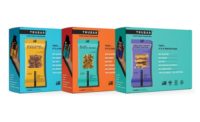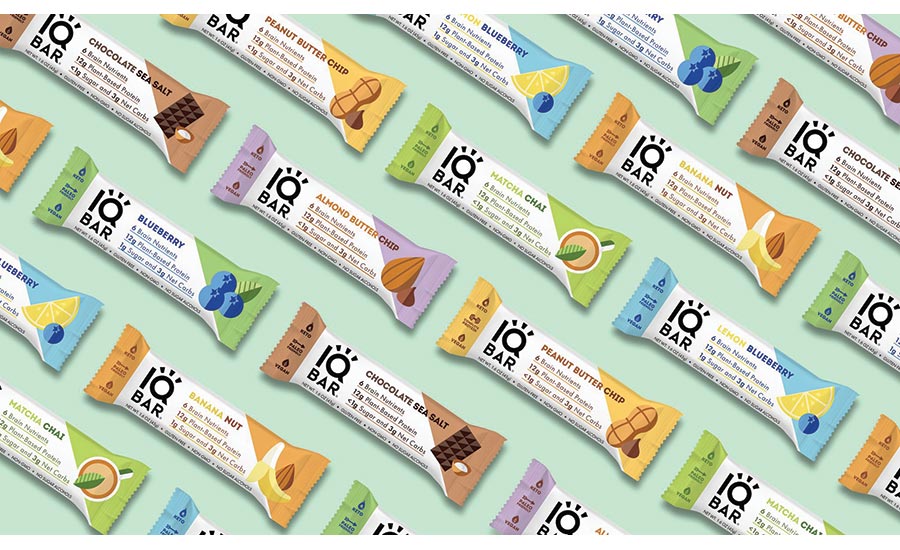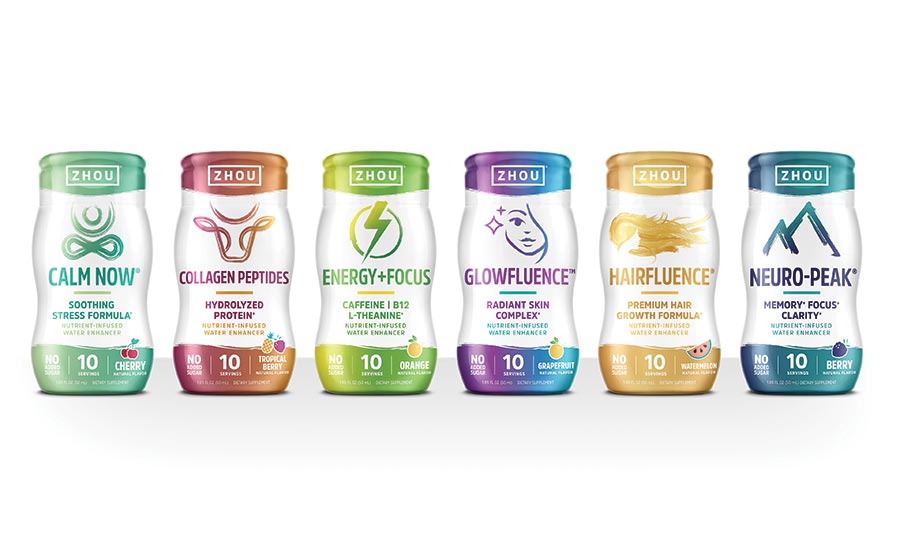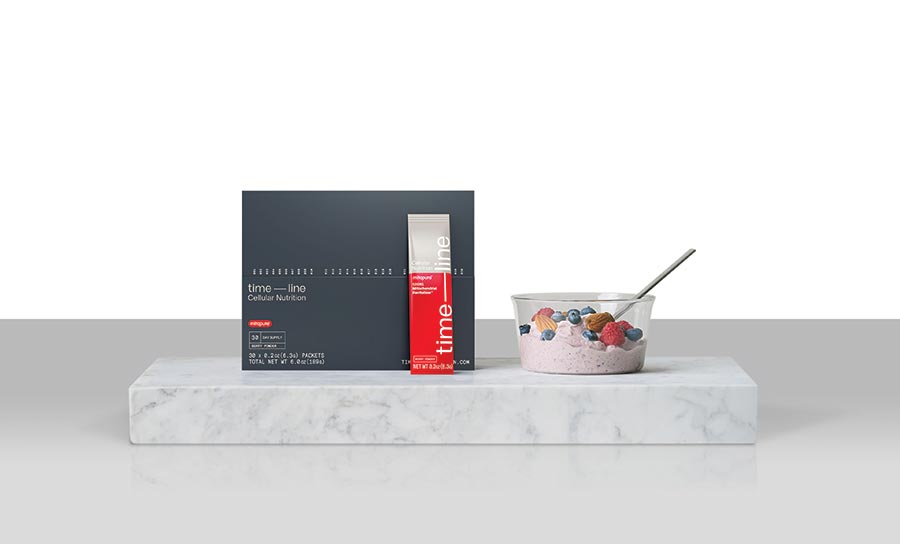More Consumers Value "Personalized Nutrition" in Selecting Foods, Drinks with Added Benefits, Dietary Appeal
When Food Gets Personal: Innova Market Insights finds personalized nutrition is on the rise and moving beyond tailored diets

PHOTO COURTESY OF: KSF ACQUISITION CORP. (www.slimfast.com)

Nestlé Health Science is working with TV host company Kelly Ripa as the brand ambassador for Persona Nutrition. New ads show Ripa maintaining her health and wellness through the brand’s personalized nutrition program. Consumers take a free online assessment to create their own unique pack of vitamins and dietary supplements that are delivered in individual tear-off packages to their door every 28 days. Persona’s online assessment factors individual needs, including age, gender, dietary preferences, stress levels, sleep patterns, fitness levels, as well as many other lifestyle factors to deliver a recommendation as unique as each consumer.
PHOTO COURTESY OF: NESTLE HEALTH SCIENCE (NESTLEHEALTHSCIENCE.COM or PERSONANUTRITION.COM)

Brain health, as part of aging, is another area of growing interest. New product development using brain health claims has seen a particular surge of activity since 2017, according to Innova Market Insights.
PHOTO COURTESY OF: IQBAR INC. (WWW.EATIQBAR.COM)

Zhou Nutrition, Park City, Utah, introduced six Zhou Nutrition Water Enhancers. Officials say the concentrated liquid formulas easily mix into any beverage. Says Zhou, “Simply add two squeezes into water, juice, smoothies and more for a daily boost of wellness on-the-go.”
PHOTO COURTESY OF: ZHOU NUTRITION (WWW.ZHOUNUTRITION.COM)

Amazentis says its new Timeline Cellular Nutrition is the first brand to offer Mitopure, a highly pure form of Urolithin A to help counter age-associated cellular decline and improve muscular strength.
PHOTO COURTESY OF: AMAZENTIS (WWW.TIMELINENUTRITION.COM)





Thanks to technological advances and ever-expanding choice in foodservice and retail venues, each of today’s consumers can adopt a more individual approach to eating. Innova Market Insights finds personalized nutrition is on the rise and moving beyond tailored diets.
“Eating for Me” was one of Innova Market Insights Top Trends back in 2019 and it’s clear that this trend continues. Whether they’re doing it for health or even ethical reasons, more consumers are embracing nutritional patterns increasingly tailored to their needs or interests. Moreover, technology advances are enabling food and beverage processors to more quickly diversify and personalize a new generation of product offerings with intrinsic or added health benefits.
Responding to a 2019 global Innova Consumer Survey, seven out of 10 consumers said they made changes during the preceding past year to improve their health. Moreover, these changes were not just for physical health. Rather, consumers said they now are balancing physical, mental and emotional health needs.
For the record, changes to improve physical wellness were cited by the majority (68%) of respondents. Interestingly though, numbers also were significant for those identifying mental health, emotional wellness and spiritual health as important. These criteria were identified by 55%, 52% and 26% of consumers, respectively.
Who Wants What—By Age
Perhaps what’s not surprising is the fact that there’s now a thriving market for new nutritional offerings that appeal to both physical and emotional wellbeing. Food and beverage formulators also can consider specific holistic approaches while they target the needs and preferences of different generations. Research in 2019 from Innova Market Insights identified key characteristics and differences among consumer groups—including Generation Z, Millennials, Generation X and Baby Boomers. Afterward, Innova highlighted the form that a more holistic and customized health approach might take in each case.
Generation Z, the youngest age group with consumers ages 22 or under, is the most likely to use physical activity to improve health and wellbeing. In Innova’s survey, 67% of US consumers in this age group said they are increasing physical activity to improve health and wellbeing. As a result, they are looking for food and beverage products that support physically active lifestyles. Here, new product innovation—particularly promoting protein-rich solutions—is surging.
Interesting too is the fact that these consumers have been born into a highly connected world, where traveling has become readily accessible. According to the Innova Consumer Lifestyle and Attitudes Survey (2018), travel is the top choice among Generation Z for experiences and events most enjoyed during leisure time (average of consumers in UK, US, Brazil, China, France and Germany). They are traveling the world, experiencing new cultures and exploring the taste of adventurous foods and flavors. Food and beverage processors have widely responded by developing more world flavors for young consumers to taste—when not traveling.
Products that are portable and naturally rich in protein (such as meat snacks) could connect with Gen Z’s—particularly if these new offerings are innovative with flavor. US meat snacks launches in the first half of 2020 included Wilde Chips chicken-based snacks from Wilde Brands, Boulder, Colo. Wilde Chips varieties include Chicken & Waffles, Himalayan Pink Salt & Chicken and Nashville Hot Chicken. Country Archer Provisions, San Bernadino, Calif., also introduced Grass-Fed Beef Jerky in Mango Habanero and Hatch Chile varieties, alongside more traditional Original, Teriyaki and Jalapeno options.
Meanwhile, Millennial consumers—those born between 1981 and 1996—tend to focus on balancing body and mind and a reported 53% say they want to increase “happiness.” They are interested in mental, as well as physical wellbeing, in ethical consumption and in healthy indulgence. They want to “up” positives, such as protein and fiber in the diet; rather than reduce “bad” nutritional factors. This most preferably is combined with on-the-go solutions to fit with their busy lifestyles. They are the most concerned age group when it comes to environmental and ethical issues and they even are willing to pay a little more for such products.
Generation X consumers, those between 39 and 54, focus on emotional wellbeing and 55% of US consumers in this age group take steps to improve their mental health. They like to prioritize family time and socializing (particularly outside the home), have above average levels of interest in natural and organic foods and tend to consider reducing meat, alcohol and caffeine. Likewise, they are looking to increase consumption of fruit, vegetables and fish. Natural, positively processed and guilt-free products are most likely to connect with Generation X consumers. They also express high interest in products promoting brain and mood health.
Baby Boomers generally are regarded as those born between 1946 and 1964. This put them at between 56 and 74 years old and they now make up 23% of the US population. Perhaps unsurprisingly, healthy aging is top of mind for them. Compared to other generational groups, Boomers are most likely to change their diet to improve health, with strong interest in functional foods, personalized nutrition solutions, plant-based options and in reducing intake of “bad” ingredients, such as sugar, fat and salt. An Innova Market Insights Consumer Survey indicated that 54% of US boomers had reduced sugar intake or bought more reduced sugar products to be healthier.
Functional Benefits—You Can Taste
It is clear that there are more products with active health claims catering to a variety of needs. In fact, numbers of new food and beverages with active health claims grew at a 7% compound annual growth rate from 2015 to 2019, according to Innova Market Insights. There is a particular focus on aging well—both for seniors and for younger demographics engaging with preventative care. Innova Market Insights also finds that joint health, energy/alertness, immune health and bone health are some of the fastest growing active health claims with references to particular nutrients.
Brain health, as part of aging, is another area of growing interest. New product development using brain health claims has seen a particular surge of activity since 2017, with launches seeing an 11% average annual growth rate from Innova’s 2015 to 2019 period. While sports nutrition and baby and toddler products continue to dominate new product development, there also is rising activity in areas such as snacks, soft drinks and cereal bars. US launches in recent months include the Oatmega 3 range from Boundless Nutrition (from Amplify Snack Brands / Hershey). Packaging says it contains DHA omega-3s “to fuel your brain.” Elsewhere, IQBAR Inc., Boston, says its namesake IQ Bars contain 12g of plant protein and six “brain nutrients,” including omega 3s, MCTs, Lion’s Mane, flavonoids, vitamin E and choline.
Other consumers turn to nutrition and diet to target physical appearance and “Eat Pretty” was one of Innova Market Insights’ Top Trends for 2020. The food and beverage market has a growing number of launches that border on the cosmeceutical. One recent US example comes from Zhou Nutrition, Park City, Utah, which introduced six Zhou Nutrition Water Enhancers. Officials say the concentrated liquid formulas easily mix into any beverage. Says Zhou, “Simply add two squeezes into water, juice, smoothies and more for a daily boost of wellness on-the-go.”
Besides a Neuro-Peak variety, the line includes Hairfluence (with biotin and herbal blend) Glowfluence (for skin) and Collagen Peptides. The latter offering supports healthier skin and nails, lean muscle mass, and healthy joint and tendon flexibility, officials say.
Delivering by Diet
It’s clear, meanwhile, that more consumers are shifting to new diets—and this is reflected in rising numbers of select dietary claims in new foods and drinks tracked worldwide by Innova Market Insights (2019 versus 2018). For example, use of keto-friendly claims rose 239% during this period (although from a small base and highly regionalized). Other dietary claims included plant based, which saw a 53% jump in new product claims; and vegan, which grew by 17% during just one year. Other more established claims involve those products touted as “protein” rich, which grew by 13%; and organic offerings, whose new product numbers grew by 10% from 2018 to 2019.
The ketogenic (keto) diet is high in fat and protein, but low in carbohydrates. Interestingly, it was first developed in the 1920s to treat epilepsy in children. More recently, it has surged in US popularity for weight loss purposes and has endorsements from celebrities such as Kim Kardashian and Halle Berry. This diet focuses on foods such as meat, poultry, eggs, fish, nuts and dairy. It can be difficult to sustain and thus presents opportunities for food companies to develop and promote prepared, ready-to eat- keto-friendly products (either new, reformulated or recast-relabeled).
Slimfast USA launched its original keto line in October 2018. This January, the brand came back with many more new products including three new flavors of Fat Bomb snacks, three new meal replacement bars and three flavors of ready to drink meal replacement shakes. Similarly, SBD Enterprises LLC introduced a South Beach Diet keto diet program in December 2019 along with several keto-friendly new products, including Cookie Bites.
The keto trend also taps into rising use of cauliflower as a key ingredient. That’s because it substitutes for carbohydrate-rich rice and flour, and new cauliflower-based options include pizza and pasta. Cali’flour Foods, Chico, Calif., offers a range of cauliflower-focused products sold in Whole Foods and other US natural food stores. Even some mainstream brands, as exemplified by Green Giant (B&G Foods), have launched riced cauliflower and other “riced” vegetables to substitute for traditional rice.
In addition to an increasing range of keto-friendly food and beverage products, the shift to personalized nutrition also has brought personalized keto diet meal plans, such as those from 902fit limited and KetoCustomPlan.
Of course, Keto is just one of the areas covered by the wide range of meal planning apps, in addition to those combining diet and workout plans. Another area of interest involves personalized plant-based nutrition. Nutrigenomix Inc. claims to be the first in the world to provide a genetic test developed specifically for those following a plant-based diet.
As the demand grows for personalized nutrition and nutrition services, there are increasing numbers of offerings. These range from supplements to complete diets. Meanwhile, new technologies debuting in the forms of wearable devices, mobile apps and even more forward-looking options such as artificial intelligence and genetic profiling.
For its part, Nestlé Health Science expanded into personal nutrition in 2019 with the purchase of Persona, a personalized vitamin business. Nestlé projects that the personalized nutrition and wellness retail market—including dietary supplements, nutraceuticals and functional foods—will rapidly expand to reach a value of US$50 billion by 2025.
Looking for a reprint of this article?
From high-res PDFs to custom plaques, order your copy today!












